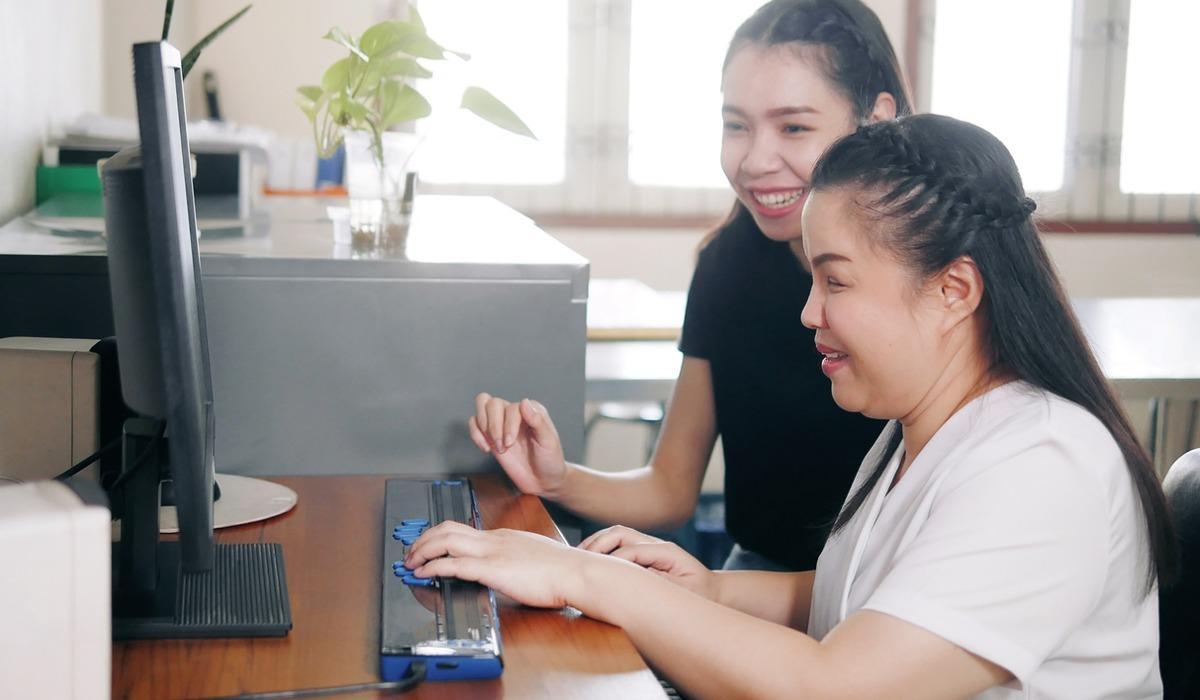
Higher education has never been more accommodating in our lifetimes, and students with disabilities can achieve great academic triumphs with support from an attentive office known on campus as the Disability Resource Center (DRC)! Not only is it their responsibility at the DRC to make education accessible and aspire to help students achieve, but they embody a caring spirit for those willing to go out of their way and request aid. Don’t let any limitations inhibit you from completing your degree or certificate... meet the allies who want to strengthen your academic presence in your courses and shape your aspirations into a reality.
Don’t Need Easy, Just Need Possible
You’d be surprised how much of the student body qualifies for the DRC’s services, but don’t take advantage of it. As an underutilized resource of the College, many arrive from high school or straight out of the workforce and are unaware of this department’s existence. Perhaps there’s an air of anxiety about asking for assistance, but truly, the team is there to provide that and more for those atypical yet equally precious college experiences. Applying is as simple as bringing up their website and clicking “Register with DRC.”
What sorts of accommodations do they offer? Many and the DRC staff wholeheartedly apply themselves to procuring whatever a student might need. As long as it does not cause an administrative burden, will not lower the College’s academic standards, or compromise the learning objectives and integrity of the course, students with disabilities can ask for anything necessary to remove a barrier to their access, and the DRC will arrange it for them.
Of course, documentation is still essential. It’s quite a simple process, though! If you’ve got a family physician, they can usually cover that ground. They’ll require tangible evidence for the arrangements, and then you’re off to a classroom environment that is hospitable for your way of receiving instruction. Determined on a case-by-case basis, here are some common, relevant services they extend:
- Extra test time.
- Notetakers.
- Distraction reduced testing room.
- Assistive technologies.
- Faculty contacts.
- Supplementary aides.
- American Sign Language interpreters and captioning.
Bill Proebstel, Disability Resource Center Specialist, is an expert in college student development and, throughout his career, has helped hundreds of students with disabilities identify their necessary accommodations and establish a situation where they can attain success dependent upon diligence in their studies.
“All of our faculty are highly engaged with my office. Anytime they get an accommodation request and are unsure how to implement it, they reach out to me immediately. We have worked with them extensively to confirm that their videos have captions. All of their documents are machine readable, so if a person’s visually impaired, that’s not a barrier to their access,” said Proebstel.
Accessibility Taps Into Potential
What does the future hold for DRC services at TMCC? Opportunity and accessibility initiatives continue to evolve, but we must adapt and remain steadfast in the universal truth we all hold dear as educators and administrators: students are the future and must come first.
There's always room for improvement, and the DRC branch has made great strides in removing educational barriers that hinder an individual's ability to learn. Through sincere collaborations across departments in eliminating physical and instructional boundaries, we maintain our core academic values as an institution with deep roots in our community.
“WebCollege does a fantastic job with their instructional design team to support Universal Design, which is the idea that we can build content and courses that will meet the needs of everyone, without a specific request for an accommodation,” said Proebstel.
“So, you construct exams that don’t have time limits, assignments that don’t necessarily require a visual or audible component, and everyone can access them. You create all the content for the course to reduce the need for anybody to ask for an exception,” continued Proebstel.
A popular concept that is on the rise, the adoption of Universal Design into our classrooms is actively seeing faculty taking its merits into account and weaving it into their curricula. It didn’t happen overnight, but we’ve discovered ideal ways for all students to engage and be enthusiastic about the work they are completing for their prospective careers.
One of the grandest positive changes has been the mass endorsement of electronic media for handouts and assignments. The transition to fully online classes was unexpected but revealed an opportunity for educational progress we had never known before!
“The expanded adoption of Canvas and digital resources has been an enormous boon to students with disabilities. The increased availability of electronic textbooks and open educational resources has been a huge benefit because they can use screen readers with those, adjust the color contrast, and manipulate them in so many ways that a hard copy textbook can’t be,” said Proebstel.
The DRC department dedicates time to equipping you with whatever instructional means or circumstances are required. Adjust your accommodations to address barriers to access or changes in your needs. As a friendly tip, all sorts of scholarships are available for students with disabilities! Scour the internet for disability scholarships and leave no stone unturned. Those seeking monetary relief can acquire a reward for their higher education efforts. You deserve it, and we’re excited to cheer you on when you do!
“I’m proud of the institution for how often we receive referrals from faculty. Faculty see the students struggle and ask if they have talked to someone in my office more than any other referral source. Many coming in from the high schools are referred to us through their special education person, but that is easily doubled by how many people are brought to me by faculty. Everybody’s doing their part,” said Proebstel.
For more information, please visit the Disability Resource Center website or call 775-673-7277.